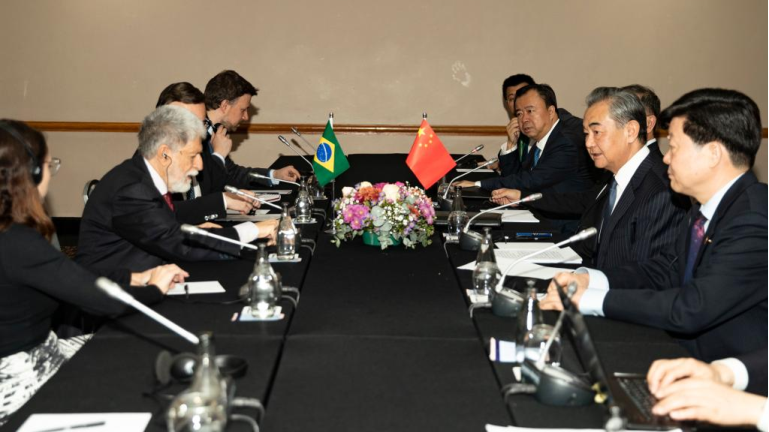
Wang Yi (2nd R), director of the Office of the Communist Party of China Central Commission for Foreign Affairs, meets with Celso Luiz Nunes Amorim (2nd L), chief advisor of the Presidency of Brazil, in Johannesburg, South Africa, July 24, 2023. /Xinhua
Wang Yi (2nd R), director of the Office of the Communist Party of China Central Commission for Foreign Affairs, meets with Celso Luiz Nunes Amorim (2nd L), chief advisor of the Presidency of Brazil, in Johannesburg, South Africa, July 24, 2023. /Xinhua
Editor's note: Stephen Ndegwa, a special commentator on current affairs for CGTN, is the Executive Director of South-South Dialogues, a Nairobi-based communications development think tank. The article reflects the author's opinions and not necessarily the views of CGTN.
Wang Yi, director of the Office of the Foreign Affairs Commission of the Communist Party of China (CPC) Central Committee, is attending the 13th Meeting of Brazil, Russia, India and South Africa (BRICS) National Security Advisers and High Representatives on National Security in Johannesburg, South Africa from July 24 to 25. Included in his itinerary before and after the security meeting are visits to Nigeria, Kenya, South Africa and Türkiye.
The choice of these countries is evidence of their strategic importance to China, particularly in regional trade and security matters. Wang Yi landed in Kenya on July 22 and held high-level talks with President William Ruto. This year marks 60 years of diplomatic relations between China and Kenya. Contrary to critics and cynics of the two countries' bilateral relationship, the meeting made it clear that the diplomatic and trade ties are growing stronger.
As one of the top Chinese government officials and a member of the Political Bureau of the CPC Central Committee, Wang Yi's visit is also a political statement of the importance of his agenda.
His visit to Türkiye, which is a member of the Northern Atlantic Treaty Organization (NATO), symbolizes China's impartiality in various conflicts. NATO is currently deeply involved in the Russia-Ukraine conflict by supplying arms to Ukraine, an ally of the Western dominated collective security outfit.
But Türkiye is also a close friend of China, and respects the latter's sovereignty. Türkiye follows the one-China principle and recognizes the People's Republic of China as the sole legal representative of China. The two countries expanded their relationship into a "strategic partnership" in 2010 and have since become close political, economic and security partners.

A sunrise view in Johannesburg, South Africa, March 7, 2023. /Xinhua
A sunrise view in Johannesburg, South Africa, March 7, 2023. /Xinhua
The Johannesburg BRICS meeting on security is an important platform for member countries to implement political and security policy cooperation. Chinese Foreign Ministry Spokesperson Mao Ning has stated that China is expected to hold in-depth conversations with the BRICS partners on the current international security situation and issues of mutual interest, build consensus and deepen cooperation to provide positive energy to a world undergoing turmoil and transformation, and make political preparations for the BRICS summit to be held in August this year.
The world is in a state of angst, with simmering conflicts and tension in various hotspots scattered around the world. The Global South needs back up and protection among themselves in order to avoid sabotage and intimidation by the developed North. The countries also need experience sharing, practical best practices and leadership that a large developing economy like China can offer.
This meeting will be an ideal opportunity to identify the Global Security Initiative (GSI),which has gained traction more than one year after it was proposed by Chinese President Xi Jinping during the annual Boao Forum on April 21, 2022. The initiative aims to "uphold the principle of indivisible security, build a balanced, effective and sustainable security architecture, and oppose the pursuit of one's own security at the cost of others' security."
Indeed, the GSI is aligned to the BRICS philosophy that seeks justice across the global socioeconomic divide. As a platform representing some of the major developing nations, it behooves BRICS to protect other developing economies from bullying by powerful countries.
China's security diplomacy carries a lot of credibility due to the country's peace credentials. Arguably, the country has never fired a shot at any of its adversaries, whether real or imagined. Neither does it interfere in the internal affairs of other countries. The furthest it goes is making proposals for peacemaking, like it has done for the ongoing Russia-Ukraine conflict, or send troops under the auspices of the United Nations peace missions.
In its relations with Africa, China has kept its promise of applying the principles of sincerity, actual results, affinity, good faith and commitment to the common good and common interests. Wang's visit is also an ideal opportunity to assess the progress made so far in realizing the outcomes of the eighth Ministerial Conference of the China-Africa Cooperation Forum and to further spur the growth of the China-Africa comprehensive strategic and cooperative partnership.
Wang Yi's current visits also put China's multilateralism into practice. Moreover, it is in cognizance of the fact that we are living in a multipolar world, with the intercontinental stopovers a reality of an interconnected world.
(If you want to contribute and have specific expertise, please contact us at opinions@cgtn.com. Follow @thouse_opinions on Twitter to discover the latest commentaries in the CGTN Opinion Section.)